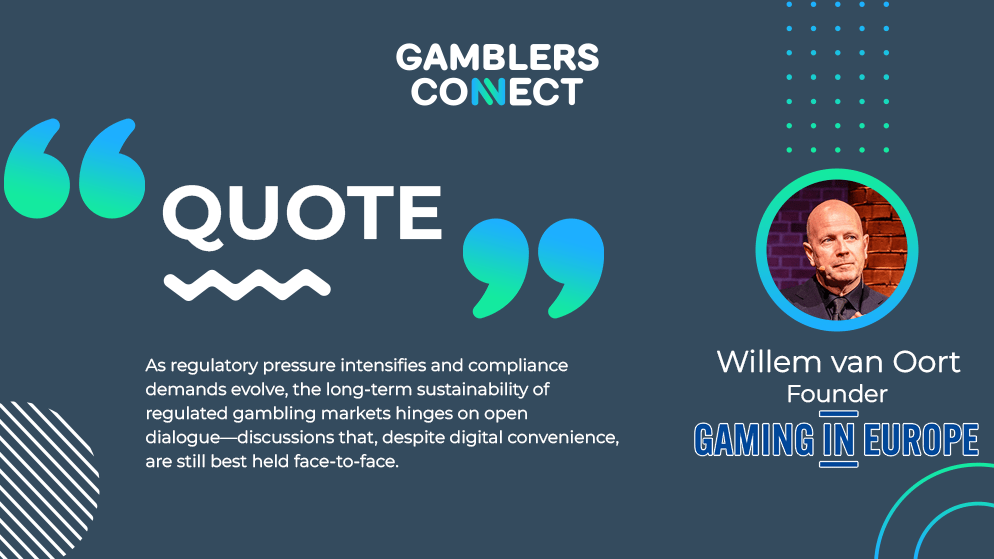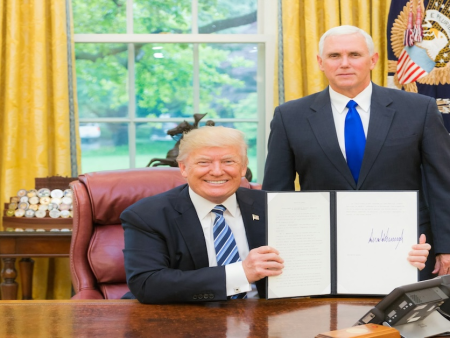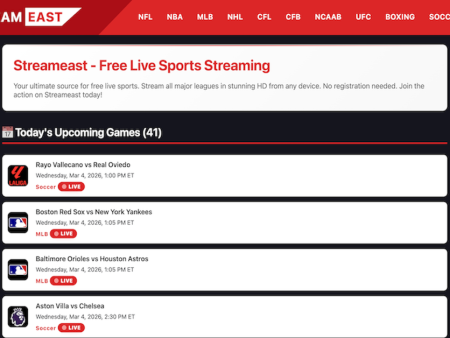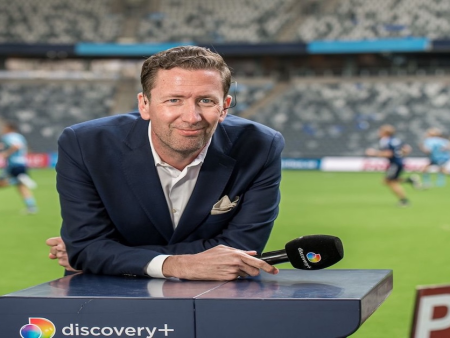
In the complex and ever-evolving landscape of European iGaming, few individuals possess a more comprehensive understanding of its regulatory and commercial intricacies than Willem van Oort. As the founder of the highly influential “Gaming in…” series of conferences and B2B communities, including Gaming in Holland, Gaming in Spain, and Gaming in Germany, Willem has established himself as a central figure and a vital connector within the industry.
Today, we have the privilege of drawing on his extensive knowledge to discuss the current state of the industry, the key challenges facing operators in 2025, and the emerging trends that will define the future of online gaming in Europe and beyond.
Hello Willem, let us begin by saying that we are stoked to have you as our guest. We appreciate you taking the time in your busy schedule to sit down and talk to us.
Willem, your reputation in the iGaming and entrepreneurship world precedes you, as you are the founder and have served as a board member for a long list of top-tier companies. When did you realize that you have a gift for entrepreneurship? And more importantly, how do you find inspiration to launch so many successful ventures?
Willem: I just like to do things. And after having worked for several large companies, I apply the things that I have learned to my own initiatives. To me, it’s as simple as that.
For the rest, I find it wonderful to work with partners and talented team members to create success together.
On a similar note, how do you find the time to balance so many successful projects? What do you find most challenging when it comes to being at the helm of several esteemed brands?
Willem: Generally speaking, things are easy if you like what you do. Of course, it’s not always easy, and time management can be an issue. Still, if you’re passionate about something, the mental energy and focus are always there. Well, at least most of the time, and that makes all the difference.
When it comes to your stacked resume, you were also a Member of the Board of Trustees at one of the foremost responsible gambling organizations, Gordon Moody. How did this experience help you later in your career in gaming, especially in your main expertise, iGaming events?
Willem: Gordon Moody is a great initiative that helps people in need. I am very happy to support them.
I have only been involved with them for two years now. Even so, what they do is a forceful reminder that gambling is more than just another business. When things go wrong, there are real consequences – both on the individual and social level.
In that sense, there is a lesson about stakeholdership. A well-functioning gambling market manages to balance the interests of all kinds of stakeholders, not just buyers and sellers. That is part of what makes this industry so interesting.
Speaking of iGaming events, you are also the founder of Gaming in Europe, a leader in compliance and one of the most renowned iGaming conferences, with more than 10,000 members across several European states, including the Netherlands, Spain, and Germany. What do you think is the most valuable contribution the platform makes to the gaming ecosystem?
Willem: Compared to the big trade shows, we have found a niche where face-to-face interaction between decision makers can be initiated in a respectful, non-confrontational way. We pride ourselves on being able to offer value to all industry stakeholders: operators, regulators, B2B providers, and RG advocates.
With that being said, our readers will be thrilled to learn that Gaming in Europe has launched its events series, with the Gaming in Holland, Gaming in Spain, and Gaming in Germany conferences. The next event in the series, the Gaming in Germany Conference, will take place on November 11, 2025, in Berlin. What are some of the topics that are relevant to all three markets, and Germany in particular?
Willem: One thing that many European markets have in common is that gambling regulations are becoming increasingly strict in order to better protect players. What we are seeing in several markets, including Germany, is that at least some of these restrictions are becoming counterproductive. The question now really becomes how much more the regulated market can take before it becomes unable to compete with illegal offers. Even in Germany, there seems to be a real awareness among at least some of the political stakeholders that we are reaching the end of what blanket restrictions can achieve.
Closely related to this discussion is the topic of the black market. Some stakeholders, at least, are getting closer to understanding just how big it is, and that having the regulator handing out fines to shell companies in Costa Rica or Panama is of limited usefulness.
In a way, we are repeating the debates we had prior to the legalization of online gambling, but now with added insights and some actual data. This, I think, is also very relevant for other jurisdictions, where similar discussions are taking place as we speak.
The German gaming market is among the strictest-regulated in Europe. What can attendees expect in terms of insights from German regulators and stakeholders?
Willem: The political situation in Germany is complex. All sixteen federal states need to be on board in order to reverse course on the current, overly restrictive approach to online gambling. This complicated political environment leaves the regulator with relatively little leeway. Still, there is some real awareness on their side, I think, that the economic viability of the legal market is important. A lot of the discussion will be about where there is room for industry accommodation within a fairly inflexible regulatory structure.
From the industry’s side, I think we need to convince the regulator, as well as other public stakeholders, that smarter, more targeted rules are better at protecting players than blanket restrictions.
In a way, the discussion will be about the question: What can you do regarding player protection without making the regulated market uncompetitive? We don’t have definitive answers yet, but I am sure there are plenty of observations and insights that will be shared during this year’s Gaming in Germany Conference.
European gaming regulations are becoming increasingly strict, especially regarding responsible gambling. What are the biggest compliance challenges operators face today? Are there any international markets that the Dutch or European gaming sector can learn from when it comes to responsible gambling initiatives?
Willem: I think European markets are at the forefront of responsible gambling. Although there is no single market that gets everything right, regulated European markets are what you should be looking at for new ideas on RG.
As to the biggest compliance challenges, regulators are increasingly shifting to restrictions such as deposit limits rather than requiring operators to carry out algorithm-based checks on actual playing behavior. Cross-operator deposit limits and affordability checks are both significant challenges, both from a technical and player-acceptance perspective.
There’s often debate about whether industry self-regulation is enough or if stricter government intervention is needed. What’s your stance on this, and how can the industry proactively improve responsible gambling measures?
Willem: Naturally, there must be something more than self-regulation alone. But government intervention can also be counterproductive. The challenge is to strike a reasonable balance, something you can only do on a case-by-case basis.
Our role, as we see it, is to bring the various stakeholders together, hoping that together they can reach the correct decision.
Being that AI is omnipresent in every aspect of our lives, we simply have to ask this question. How do you see the role of data and AI in identifying problem gambling behaviours, and what best practices should operators adopt to enhance player protection? Moreover, what is your stance on this technology?
Willem: Data and AI-driven analysis have important roles in detecting problematic gambling behavior. There is no doubt that AI is an important tool.
The essential thing is, however, that AI does what we ask it to do. Nothing more, nothing less. There is no independent consciousness, it is just an automated process. This means that every AI algorithm that we use must undergo rigorous scientific validation before it can be relied upon. In other words, are the behaviors that we are flagging indeed indicative of problematic gambling, or of something else? Another question is whether we are flagging all relevant behaviors or not.
In short, AI is undoubtedly a very useful tool, but there needs to be some kind of human determination to ensure that it is wielded correctly and fruitfully.
Gambling addiction is something that seems to take a swing with each passing day, despite the plethora of responsible gambling organizations and helpful tools players have at their disposal. What innovations or strategies do you foresee having the biggest impact on responsible gambling in the future?
Willem: Problematic behavior is often – but not always – a way to deal with pre-existing trauma. Gambling operators can’t take away the underlying issues, meaning that there is no silver bullet, and we shouldn’t look for one.
Having said that, I think we are getting close to the kind of technology that allows the micro-targeting of individual players with tailored interventions. If nothing else, this will help limit additional gambling-related harm.
Lastly, we usually tend to end each interview on a more personal note so that we and our readers can learn more about our guests. Tell us a bit about yourself, Willem. What do you like to do in your spare time? Are there any particular hobbies, interests, sports clubs, books, movies, or past-time activities you would like to share?
Willem: My great passion is live music. When it’s live, it’s unique. It is basically the same thing that we try to achieve with our events: it’s better live!
As for traveling, I like ancient places that take you back to a time that made a mark on the destination or culture that you are visiting. Again, it’s an attempt to relive the past as “live” as possible.
I guess that is the common thread in much of what I enjoy: first-hand experiences are often the best.
Thank you for finding the time to talk to us, Willem. We are grateful that we had this exclusive opportunity to pick your brain on the industry’s most pressing and crucial matters!





